 Last year was our first year of homeschooling and we spent countless hours discussing our goals for our kids and what important things we felt they must be taught. At the end of the year we held a little "kindergarten graduation ceremony" for Jacob where he read his book (about a boy travelling in a camel caravan to Axum) aloud, showed off his math prowess, discussed the artists he studied and shared the lime light with Danny and Libby as they recited poems they had learned in the course of the year. Erik holed up for about 30 minutes before our guests arrived to write what he called "A Commencement Address for My Son's Kindergarten Graduation." I love it and here it is.
Last year was our first year of homeschooling and we spent countless hours discussing our goals for our kids and what important things we felt they must be taught. At the end of the year we held a little "kindergarten graduation ceremony" for Jacob where he read his book (about a boy travelling in a camel caravan to Axum) aloud, showed off his math prowess, discussed the artists he studied and shared the lime light with Danny and Libby as they recited poems they had learned in the course of the year. Erik holed up for about 30 minutes before our guests arrived to write what he called "A Commencement Address for My Son's Kindergarten Graduation." I love it and here it is.You might think it a bit ridiculous to deliver a speech on the philosophy of education at a kindergarten graduation. Well then consider me a ridiculous man.
Believe it or not, I am convinced that the philosophy of education is in fact discussed at every single graduation, though not often directly. Graduation day gives testimony to the entire school year, and the year gives testimony to the educator's philosophy of education.
Some of these educators might dare to declare that they have no philosophy of education at all, but I beg to differ. C.S. Lewis once said that those who fail to study theology "will not have no ideas about God but only a lot of wrong ones." The same is true in education. Educators who fail to study the philosophy of education will simply have a lot of wrong ideas of education.
It has been well said that "education is what remains after the information that has been taught has been forgotten." Over the past year, my son has received much instruction, but I hope that he has received more than that - in fact, the beginnings of an education.
Years from now, my son will not likely remember small details about the millennial-long reign of the kingdom of Axum in present-day Ethiopia and the impact on trade in the Fertile Crescent. But perhaps he will remember that there are civilizations far removed in space, time, custom and practice from his hometown, and that mothers should be insistent, but patient.
Years from now, my son will hopefully remember his simple addition facts (that is, if calculators haven't taken control of the Senate by then), but I expect that he will remember much more, that God has ordered the universe, and that logic applies to the smallest reaches of that universe, even in the grocery store.
Years from now, my son will probably not remember the names of paintings by Benjamin West, but perhaps he will remember that some boys like to paint, and that beauty comes not only from function, but also from form.
Years from now, my son will probably not remember the cacophonous family worship sessions we held before bedtime, but I expect that he will remember that music can mimic the unexplainable presence of God in a household - and perhaps even become worship for a family.
Years from now, my son will hopefully remember the story of Daniel and the lions' den, but I pray that more importantly, he would remember the sovereignty of God over even the greatest of men and beasts - whichever might lie in his path.
Years from now, my son might remember the holes we dug deep into the caliche of our backyard to plant some small trees, but I anticipate that he will remember that perhaps the best sort of play is work - cultivation of the lives of others - and that fathers should be always working, but never busy.
Years from now, my son will probably not remember his Sunday school teacher or choir director or even the name of his first pastor, but I pray that he does remember that there is a Body of believers here on earth and that his place with them is one of joyful service.
Years from now, my son will not remember the surname of our neighbors, but I pray he will remember that God has set the exact places and times in which he will live, , and that there is divine purpose in that providence.
Years from now, I expect that my son will remember his family - those made by blood, those made by marriage, and those made by love alone. He may not yet know exactly where babies come from, but he does know that it involves God, a mother, a father and a social worker.
And finally, years from now, as he lies in his deathbed, he may not remember the name of those he visited in hospitals and on hospice, but I pray, with all my being, that he will have lived with an understanding of what life is, and that he might face death as a conquered enemy, no longer to be feared, longing to see the face of God.
Happy birthday Daddy




 In the meanwhile here are some pictures of the shindig we held in her honor! We have a ton of pictures but as I started choosing I realized how many families in the church God has raised up to love His cherished little ones who were without protection. Almost every picture had
In the meanwhile here are some pictures of the shindig we held in her honor! We have a ton of pictures but as I started choosing I realized how many families in the church God has raised up to love His cherished little ones who were without protection. Almost every picture had 

 My superheroes! Maggie's big day would never have been as beautiful and perfect if it weren't for all the hard work of these two. Love you
My superheroes! Maggie's big day would never have been as beautiful and perfect if it weren't for all the hard work of these two. Love you 




